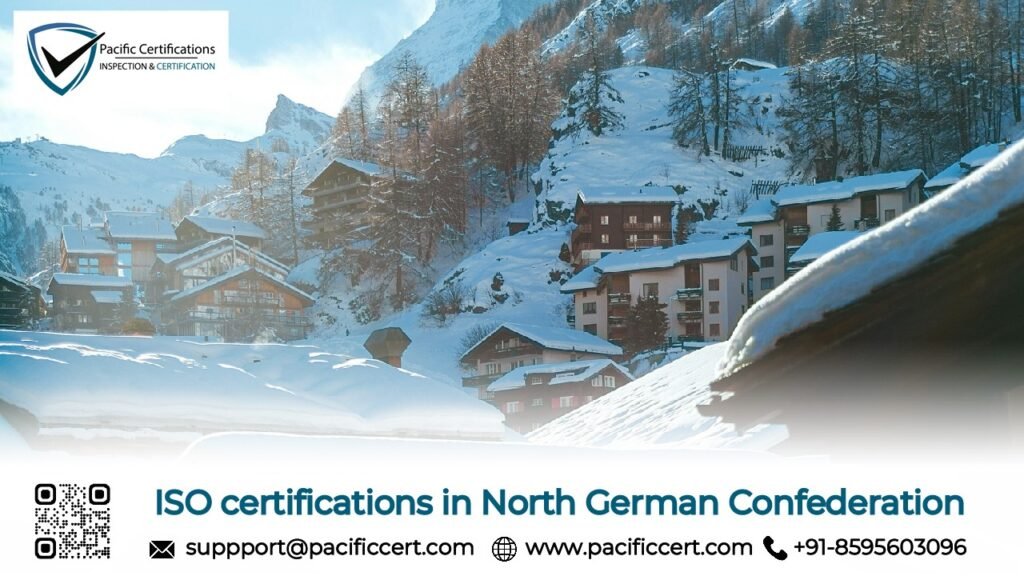
ISO Certifications in North German Confederation and How Pacific Certifications can help
In today’s interconnected global market, ISO certifications are not just a standard of excellence but a necessity for businesses seeking to thrive. For companies operating within the North German Confederation, the adoption and adherence to ISO standards have become crucial. These certifications serve as a mark of quality, safety, and efficiency, enabling businesses to compete on an international level.
Applicable ISO Standards in the North German Confederation
ISO 9001: Quality Management Systems (QMS)
ISO 9001 is the most widely recognized and implemented quality management standard globally. It provides a framework for businesses to ensure consistent quality in their products and services.
ISO 14001: Environmental Management Systems (EMS)
This standard provides guidelines for implementing an effective environmental management system, helping companies minimize their environmental impact and comply with environmental regulations.
ISO 45001: Occupational Health and Safety Management Systems
ISO 45001 focuses on ensuring a safe and healthy working environment for employees. This standard is particularly important in high-risk industries such as construction, manufacturing, and chemical production.
ISO 27001: Information Security Management Systems (ISMS)
In an era where data breaches and cyber threats are prevalent, ISO 27001 certification is essential for businesses that handle sensitive information.
ISO 50001: Energy Management Systems
Energy efficiency is a growing concern globally, and ISO 50001 provides a framework for businesses to manage and reduce their energy consumption.
Click here to find out more applicable standards to your industry
In this year, the North German Confederation shows a marked increase in the adoption of ISO certifications, particularly in sectors such as renewable energy, advanced manufacturing, and digital technology. Research indicates that businesses are increasingly recognizing the value of ISO certifications. Companies that are proactive in obtaining ISO certifications are better positioned to meet market demands and regulatory changes, ensuring long-term success.
If you are looking for ISO Certification for your company, contact us today at support@pacificcert.com.
How Pacific Certifications Can Assist
At Pacific Certifications, we specialize in auditing and certifying organizations to these internationally recognized ISO standards. Our team of experienced auditors works meticulously to ensure that your organization meets the stringent requirements of these standards. Here’s how we can assist:
Pre-Audit Assessment
- We perform a detailed gap analysis to identify areas where your current practices diverge from the standard requirements.
Stage 1 Audit
- In this initial audit phase, we evaluate your organization’s readiness for the full certification audit.
Stage 2 Audit
- Our auditors conduct a thorough on-site or virtual assessment to verify the implementation and effectiveness of your management system.
- After the audit, we present a detailed report highlighting findings, non-conformities, and areas of improvement.
Certification Decision
- Our certification board reviews the audit findings and the effectiveness of corrective actions. Upon approval, we proceed with the certification issuance.
- Once your organization meets all requirements, we issue the certification. The certificate is valid three years, with annual surveillance audits to ensure ongoing compliance.
We also provide after certification support:
- Post-Certification Support
- Surveillance Audits
- Re-Certification Audits
ISO certifications are a powerful tool for businesses in the North German Confederation to enhance their operations, ensure compliance, and gain a competitive edge in the global market. With the support of Pacific Certifications, achieving and maintaining these certifications is a streamlined and efficient process. Our expertise in audit and certification ensures that your organization not only meets but exceeds the stringent requirements of ISO standards.
Requirements of ISO Certifications in North German Confederation
Key ISO Certifications and Their Requirements
ISO 9001: Quality Management System
Requirements:
- Establish a systematic approach to managing processes, ensuring consistent quality.
- Implement a process of continual improvement and customer satisfaction.
- Maintain detailed documentation of all processes.
- Conduct regular internal audits to ensure compliance and improvement.
ISO 14001: Environmental Management System
Requirements:
- Develop an environmental management policy and objectives aligned with regulatory requirements.
- Identify environmental aspects and impacts, and establish controls to mitigate negative impacts.
- Implement measures for sustainable resource use, waste management, and pollution prevention.
- Ensure continuous monitoring and review of environmental performance.
ISO 45001: Occupational Health and Safety Management System
Requirements:
- Establish a robust health and safety management framework.
- Identify and assess workplace risks, and implement controls to mitigate them.
- Ensure worker participation in health and safety processes.
- Conduct regular training and awareness programs for employees.
- Continuous monitoring, incident reporting, and improvement of health and safety measures.
ISO 27001: Information Security Management System
Requirements:
- Develop an information security policy and establish a risk management process.
- Identify information security risks and implement controls to mitigate them.
- Ensure the confidentiality, integrity, and availability of information.
- Conduct regular audits and reviews of the information security management system.
ISO 50001: Energy Management System
Requirements:
- Develop an energy management policy and establish energy performance objectives.
- Conduct energy audits to identify areas for improvement.
- Implement energy-efficient technologies and practices.
- Regularly monitor and review energy performance and make necessary adjustments.
Benefits of ISO Certificationsin North German Confederation
- Achieving ISO certifications signals to customers, partners, and stakeholders that the organization meets internationally recognized standards.
- ISO standards provide a framework for streamlining processes, reducing waste, and improving overall operational efficiency.
- ISO certifications help organizations stay compliant with legal and regulatory requirements in their respective industries.
- Implementing ISO standards helps organizations identify and manage various risks, including those related to quality, environmental impact, occupational health and safety, and information security.
- ISO certifications are recognized globally, which can help organizations in the northern German region expand into international markets.
- By following ISO standards, organizations can ensure consistent quality, safety, and reliability of their products or services. This leads to higher customer satisfaction and loyalty.
- ISO 45001, in particular, emphasizes worker participation and safety, leading to a safer work environment and increased employee morale.
- ISO 14001 and ISO 50001 certifications demonstrate an organization’s commitment to environmental sustainability and energy efficiency.
ISO certifications offer a multitude of benefits to businesses in the North German, from enhanced market access and operational efficiency to improved customer satisfaction and brand reputation. These certifications are an investment in the future, providing a solid foundation for long-term success in an increasingly competitive and globalized market.
Contact us today to start your certification journey!
Which Industries need ISO Certifications in North German
In the North German, ISO certifications are becoming increasingly critical across various industries. These certifications ensure that organizations adhere to internationally recognized standards for quality, safety, and efficiency. Below are the key industries in the North German Confederation where ISO certifications are particularly essential.
Manufacturing Industry
The manufacturing sector is one of the most significant industries requiring ISO certifications in the North German Confederation. Due to the complexity and scale of operations, manufacturing companies must ensure that their processes are efficient, consistent, and of high quality.
Automotive Industry
The automotive industry is another major sector in the North German Confederation where ISO certifications are crucial. Given the global nature of the automotive supply chain, companies in this industry must adhere to stringent quality and safety standards.
Healthcare and Pharmaceuticals
The healthcare and pharmaceutical industries are heavily regulated, making ISO certifications indispensable for organizations in these sectors. These certifications ensure that products and services meet strict quality, safety, and regulatory standards.
Information Technology (IT) and Telecommunications
With the increasing reliance on digital technologies, the IT and telecommunications industries in the North German Confederation must ensure the security and quality of their services. ISO certifications provide a framework for managing information security, quality, and service management.
Construction and Engineering
The construction and engineering industries in the North German Confederation require stringent controls to ensure safety, quality, and environmental sustainability. ISO certifications help these companies manage complex projects and meet regulatory requirements.
Food and Beverage Industry
The food and beverage industry is highly regulated, and ISO certifications are critical for ensuring food safety, quality, and regulatory compliance in the North German Confederation.
Energy and Utilities
The energy and utilities sector is crucial to the North German Confederation’s economy, and ISO certifications help these industries manage resources efficiently, ensure safety, and meet environmental regulations.
Aerospace and Defense
The aerospace and defense industries in the North German Confederation operate in highly regulated environments where safety, quality, and security are paramount. ISO certifications ensure that these industries meet the highest standards in product development, manufacturing, and service delivery.
Transportation and Logistics
The transportation and logistics industry in the North German Confederation requires ISO certifications to ensure efficiency, safety, and environmental sustainability across supply chains.
Chemical and Pharmaceutical Industry
The chemical and pharmaceutical industries are highly regulated and require ISO certifications to ensure product safety, quality, and compliance with international standards.
ISO certifications are critical across various industries in the North German, helping organizations ensure quality, safety, efficiency, and regulatory compliance. Whether in manufacturing, healthcare, IT, or any other industry, ISO certifications provide a strong framework for continuous improvement and long-term success.
Pacific Certifications is accredited by ABIS, in case you need support with ISO certification for your business in North German Union, please contact us at support@pacificcert.com or +91-8595603096.
FAQs: ISO Certifications in North German Confederation
ISO certifications are internationally recognized standards that ensure organizations meet specific criteria for quality, safety, efficiency, and environmental management.
ISO certifications are crucial in the North German Confederation for enhancing market access, ensuring regulatory compliance, improving operational efficiency, and boosting customer confidence.
Key industries include manufacturing, automotive, healthcare, IT, construction, food and beverage, energy, aerospace, transportation, and chemical industries.
ISO 9001 is a standard for Quality Management Systems. It ensures consistent product and service quality, which is essential for customer satisfaction and operational efficiency.
Businesses can obtain ISO certification by developing a management system that meets the ISO standards, conducting internal audits, and undergoing an external audit by an accredited certification body like Pacific Certifications.
ISO 14001 helps organizations manage their environmental impact, reduce waste, comply with regulations, and improve sustainability efforts.
Read More at: Blogs by Pacific Certifications








